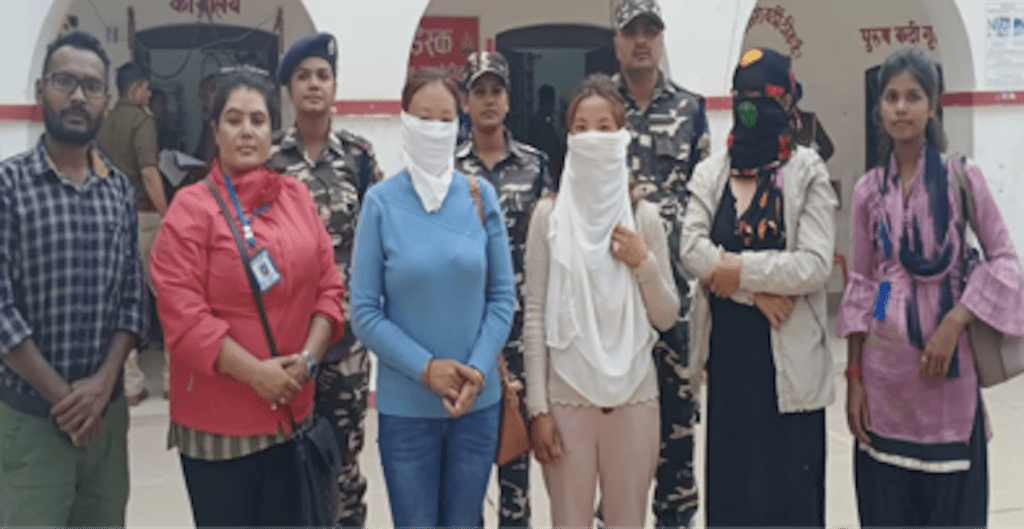Had it not been for the intervention of Caritas India’s anti-human trafficking team the fate of 19-year-old Nepalese girl Yamuna would be entirely different.
In February this year, when the COVID-19 pandemic was yet to bring the world to its knees, Yamuna was lured by an agent to sign up for a ‘job’ in the Middle East.
Yamuna’s family had a small farm near the border with India where they used to grow vegetables for sale, but unseasonal rains wreaked havoc, leaving their farm barren and uncultivable for at least a year. With no income her family found themselves in a dire situation.
“After the rains destroyed the farm, we had no way to pay back a bank loan against the farm land and we had no food to eat,” Yamuna said.
In March, she came in contact with a New Delhi woman who offered her a position as a waitress at a restaurant in Iraq that supposedly included a decent salary plus accommodation.
“It was like a light at the end of the tunnel. I readily accepted the offer and told the lady that I would be ready to leave as early as possible,” she said.
Yamuna prepared her passport and readied herself to make the most of the opportunity that she hoped could help her family.
“I have three little sisters and a brother. My father is sick most of the time and that is why I didn’t think twice about saying yes to going to a new country. All I wanted was to earn money,” she said.
Yamuna said farewell to her family and left with the woman to go to New Delhi where visa formalities were meant to be done.
After reaching the Nepal-India border, members of Caritas’ anti-human trafficking team approached her to learn of her situation. They asked Yamuna some questions and they became suspicious that she was being tricked by the woman who they suspected was a trafficking agent. Indian police became involved and they further questioned the New Delhi woman and it became clear she was going to illegally traffic Yamuna to another agent based in Iraq.

The Caritas team took care of Yamuna and admitted her to their counselling center in Uttar Pradesh, India.
Shimray Mungreiphy, who leads Caritas India’s anti-human trafficking team in New Delhi, said Yamuna and her family were advised by Caritas counsellors about the perils of human traffickers.
“These trafficking agents have a very strong network, even in far off hamlets. They prey on people in dire need of money and tell these vulnerable people of fake opportunities overseas, but they end up being sold in the foreign countries,” she said.
After Yamuna returned home, Caritas have kept in touch with her and her family while Caritas members and partner organizations in Nepal have also been advising them on how to start farming again and make profitable yields.
Thousands of women, girls trafficked each year
In January this year, Kamana, 13, fled from an abusive home situation in Nepalgunj city in Nepal’s south where her step-mother was allegedly beating her over petty issues.
Not long after leaving her home, Kamana met a Nepalese man — understood now to be a trafficking agent — who said he would take her to her birth mother in New Delhi. However, the man allegedly raped her repeatedly during the journey. When they reached New Delhi, the agent took her in an autorickshaw to a hotel where she was to be sold to traffickers.
By chance, the driver of the autorickshaw had recently attended a Caritas anti- trafficking workshop and sensed the girl was in trouble. He called a Caritas team and gave them the hotel’s location where Kamana was taken to.
The Caritas team contacted police who rescued the girl from the traffickers. Kamana is now undergoing counselling in one of the Caritas-run centers in India’s Uttar Pradesh.
Thousands of women and girls from Nepal are trafficked to India and other countries for the purposes of commercial sexual exploitation each year.
In order to combat this, Caritas India, in collaboration with other NGOs, are running an anti-human trafficking program in various Indian cities.
“With this program there are constant consultations, workshops and seminars being held in many cities wherein we have seen surge in trafficking cases,” Caritas program officer Shimray said.
“Locals are made aware about dos and don’ts plus we hold routine awareness programs in remote villages,” Mungreiphy said.
Rajesh Upadhyay, head of Caritas India’s anti-trafficking efforts, said the pandemic has increased poverty in many parts of India as well as in neighboring countries, which he fears will result in more future trafficking cases.






